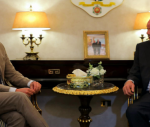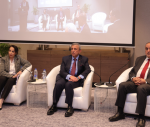You are here
Are sanctions saving Russia?
Oct 18,2015 - Last updated at Oct 18,2015
The economic sanctions imposed on Russia by the West in March 2014 have undoubtedly been painful. But they have so far failed to achieve the goal of weakening Russian President Vladimir Putin’s position.
In fact, they may have the opposite effect, leaving Russia — and its president — even stronger than before.
European Union countries are estimated to have lost about $100 billion in trade with Russia, hitting the likes of Bavarian dairy farmers and eastern German industrial exporters.
Russian GDP, which grew modestly in 2014, contracted by 4.6 per cent in annual terms in the second quarter of this year.
The ruble lost more than half of its US dollar value in the second half of last year, fuelling inflation, which increased by 15.6 per cent year on year in July.
But inflation now seems to have peaked, and the effects of the drop in oil and gas prices were mitigated by the US dollar’s appreciation, so that the value of Russia’s foreign reserves actually increased, reaching $362 billion in June (13 per cent of which is in gold).
And despite belt-tightening in Russia, Putin is more popular than ever.
The rationale behind economic sanctions is straightforward: free trade and free markets deliver growth (and thus political support for the government), whereas restrictions choke off growth (and thus erode support for the government).
This emphasis on free trade and free markets was a central tenet of 19th-century British classical economics.
It remains a core message of today’s dominant neoclassical school — embodied in the so-called “Washington Consensus”, adopted across the world under the International Monetary Fund’s advice — which claims that the key to economic development is to open up, deregulate, liberalise and privatise.
But the theory is fundamentally flawed.
No economic power has ever developed solely on the basis of laissez-faire policies.
The economic rise of the United Kingdom, for example, was heavily dependent on strategic protection, industrial policy, tariffs and non-tariff trade barriers.
The UK’s industrial prowess originated with the textile industry. The country’s leaders realised that the export of raw materials, mainly wool, would be inadequate to spur economic development. For that, England would have to move up the value-added ladder, by importing raw materials and exporting finished goods.
So England’s leaders devised an industrial policy, which entailed bringing in Flemish textile weavers to provide know how to British firms.
Moreover, they erected trade barriers.
By banning the export of raw wool and the import of finished wool products, Indian textiles, which were often superior and cheaper, could not compete with domestic output.
They adopted navigation laws that restricted foreign ships’ access to British ports and even enacted a demand-boosting law requiring the dead to be buried in woolens.
Ultimately, the mechanisation of the textile industry ushered in the Industrial Revolution, and mass production and exports underpinned the development of the world’s largest maritime fleet.
In the mid-19th century, German economist Friedrich List highlighted the role that such policies played in the UK’s development.
In line with his advice, the United States, Germany and Japan employed judicious trade protection and industrial policies, while working actively to support nascent sectors — a strategy that enabled them to develop rapidly and even overtake Britain.
Restrictions also proved effective to spur economic development: In 1812, when the UK declared war and imposed a trade embargo on the US, import substitution caused American manufacturing to flourish.
When the embargo was lifted and trade tariffs were reduced, US manufacturing floundered — until 1828, when new British tariffs boosted US manufacturing again.
Likewise, during World War I, a British trade embargo spurred the development of German high-tech industries due to the demand for substitutes.
Of course, embargoes can have a devastating effect when a country lacks the resources needed for import substitution.
That is why economic sanctions were so damaging for Iran and, earlier, for Iraq’s population.
But, for a country like Russia, with its abundant natural resources, technological expertise, and skilled workforce, sanctions can have the opposite effect.
The Soviet Union struggled to capitalise on these factors, owing to communism’s weak incentive structure. Today, by contrast, Russia has a capitalist system that offers considerable benefits to those who adapt best to the restrictions.
In short, Russia has all it needs to thrive, despite — or because of — the sanctions.
But turning opportunity into reality requires Russia to pursue an economic transformation.
Neoclassical trade theory is based on the concept of comparative advantage: countries should capitalise on their relative strengths, from technological prowess to resource endowments.
But as English leaders knew and as the experience of many African and Latin American countries has shown, simply exporting raw materials is inadequate to propel development.
Historically, the most effective development policy has centred on government intervention to establish higher-value-added domestic industries.
In previous decades, Japan, Taiwan, South Korea and China have all taken this path.
For Russia, moving up the value-added ladder should not be difficult; it has all it needs to manufacture the finished products that it previously imported.
In fact, import substitution has already increased productivity in several key sectors: engineering, petrochemicals, light industry, pharmaceuticals and agriculture.
Annual exports of high-value-added goods rose by 6 per cent in the first quarter of this year.
Furthermore, Russia’s leadership has accelerated cooperation with the other BRICS economies (Brazil, India, China and South Africa), and Putin recently announced ambitious plans to boost domestic demand.
The West’s sanctions against Russia may not only fail to change the Ukraine situation; they may well spur the country’s long-awaited structural transformation.
If Russia successfully replicates the credit-guidance regime used by East Asia’s economies, while increasing managerial efficiency, yet another economic miracle is possible.
Richard A. Werner is professor of international banking at the University of Southampton and author of “New Paradigm in Macroeconomics”. Vladimir I. Yakunin is chair in state policy at Lomonosov Moscow State University, founding president of the World Public Forum, and former chairman of Russian Railways. ©Project Syndicate, 2015. www.project-syndicate.org













